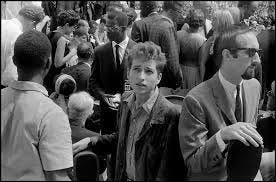Don't write about Dylan.
That's my advice. I've mostly taken it.
Lots of chatter about Bob Dylan right now, thanks of course to the bio-pic, so I’m pasting links to the very few times I’ve written about him (I was actually a “music writer” for a bit). But I’ve written about him only in the context of writing about other people and situations, and some of them are in the movie as well, and so I include links to pieces about them that don’t even mention Dylan.
“Come All You Blackface Freaks and Hillwilliams: 200 Years of Roots-Rock Revival (A Memoir).” The big Seeger/Dylan/Guthrie thing comes up here, as do Lead Belly, Alan Lomax, and a lot of other stuff—the first nonfiction I ever published, a late-’90’s cover story for New York Press. The piece was acquired and edited by Sam Sifton and John Strasbaugh and started me on a whole thing, very exciting at the time. Please be advised that this piece includes some quoted uses of the “n” word, as well as other racist slurs that once served as terms of art in the American music business. Also see some notes on the piece’s evolution since the ‘90’s.
“Corn Bread When I’m Hungry,” Part One (paywall), Part Two (no paywall!). Dylan’s and The Band’s “Basement Tapes” comes up here. This was my first nationally published piece, in the print Atlantic, near the end of its long period as a general-interest magazine under the editorship of the great Bill Whitworth. From Bill and his staff, I learned some important lessons about how I should and shouldn’t be writing this kind of thing. (The online version’s two parts no longer link to each other.)
“American Dreamers.” No Dylan here, just Pete Seeger meets William F. Buckley; also Charles Seeger, Ruth Crawford Seeger, the early National Review, and more. l think this is the second or third major essay I did for Boston Review, print, with online still looking like a kind of adjunct, though we already knew better. Deb Chasman guided me away from a tendency toward knowingness and snark, as had Bill Whitworth, with lasting consequences not just for this piece but for how I try to approach expository writing in general (though on the blog I do at times indulge). Greil Marcus selected this one for the tenth-anniversery issue (nearly the final issue, I think) of Best American Music Writing, which tells you something about the gentleman and scholar Greil is—at least it does if you’ve read “Corn Bread,” above.
“Emulating the Real and Vital Guthrie, Not St. Woody.” No Dylan, but plenty of Guthrie, and one of a few unusual pieces I got to write on roots music for the Sunday New York Times Arts & Leisure Section in the brief, shining moment when it was edited by Jodi Kantor; with Sam Sifton then at the culture desk, I think, and lending important support, though I can’t remember his exact official role at the time; and Fletcher Roberts involved too. The coup was getting the Bottle Rockets splashed all over the music page of the print section, a stunning effect which can’t be reproduced in the online version. (No, I don’t like “Mermaid Avenue,” don’t come at me with that.)
“This Machine Kills Fascists.” No, it doesn’t. Fascists like nothing better than folk music and singalongs. I don’t mention Dylan here. And yet my dimmer views have been inspired by his, in so many ways. This was posted on my old blog, now archived.
“(Last? Nah) Thoughts on Woody Guthrie.” Also from the old blog. The title here riffs on Dylan, and his work comes up in the piece itself, which is about why I dig Guthrie and Dylan and don’t dig the Weavers and Peter, Paul, and Mary (Joan Baez comes up too).
“Which Side Are You On, Boys.” More Seeger and Guthrie—plus the Almanac Singers, the 1930’s Stalinist American left, the Holocaust, the Popular Front, “protest songs,” etc. That’s Part One in a series. Part Two here, and Part Three, with a Dylan quote in a caption, here.
Pretty sure that’s it!


Ha! I’ve pulled up most of these in the last week, and put the Minstrel opus in as a link to my comment in Michael Moynihan’s piece about Seeger’s politics and his casting out of Dylan after he Went Electric.
It’s the section comparing Seeger’s affect with Dylan’s more accurate connection to folk that made me think of it: “It’s something else again: everything that the folk revival had tried to purge from folk music, pouring back in through Bob Dylan’s singing”
I will say that I have always thought you were too hard on yourself as a high-schooler in the concluding anecdote. I was born in 1971, so it was just slightly before my time. I fondly remember watching the Jackson 5 cartoon show and wouldn’t think of their music as alien, and as a teenager I loved the R Crumb album covers and had no idea they were related to minstrelsy, but I don’t think you did at that time, either. Ben Appel recently said something on a podcast I listen to: Every activist is using their activism to work through a past trauma. I think it’s broader than that, and it applies to everyone, so when I read your work I sometimes go back to you in that lounge, trying to fight off a hurt black girl’s accusation of “racist!”, plunged beyond a teenager’s depth, and I hope you can forgive both yourself and that girl, and not assume either of you were on the side of the angels, just people who sometimes lash out. (Especially teenagers!)